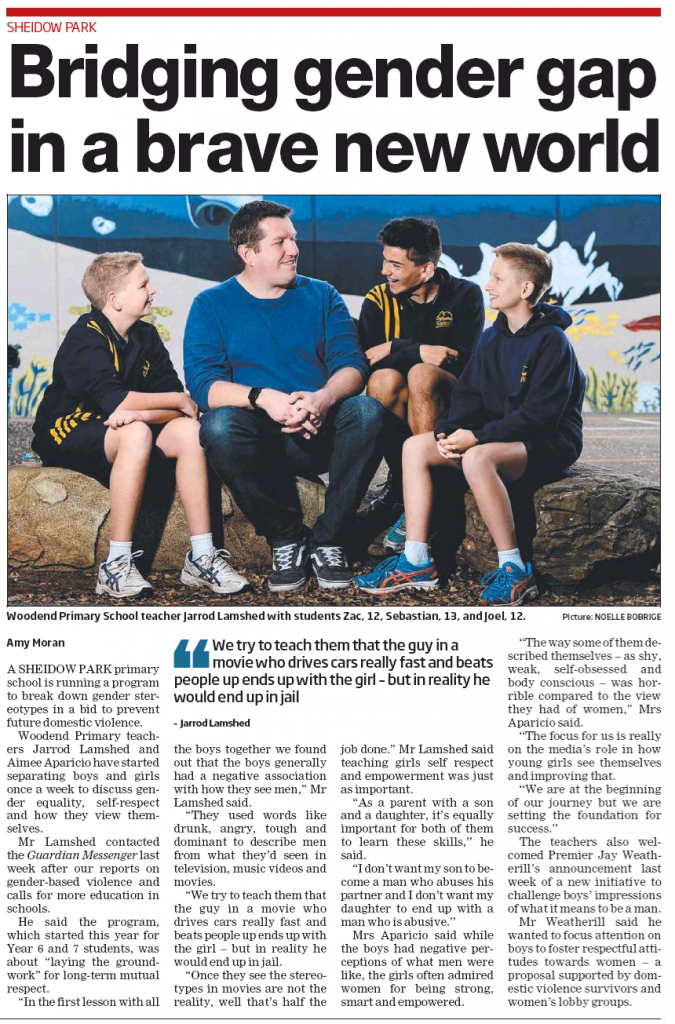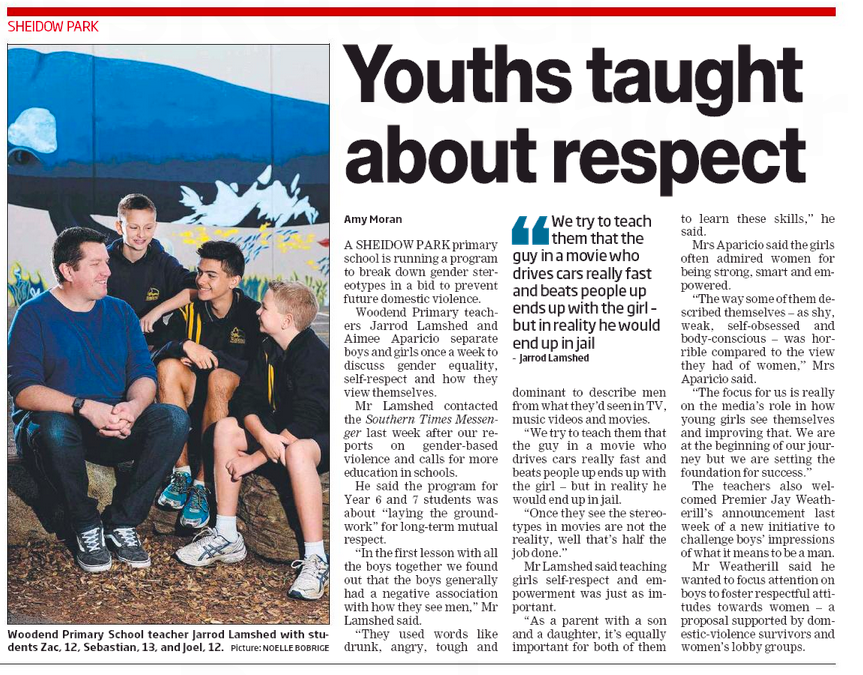Category: 1. Know students & how they learn, 3. Plan and implement for effective teaching & learning, 4. Create and maintain supportive & safe learning environments, 6. Engage in professional learning, 7. Engage professionally with colleagues, parents/ carers and the community
Tags: 10 responses to man up, @charliepick, @jlamshed, Boys Education, Charlie Pickering, Girls Education, Jackson Katz, Jarrod Lamshed, Sexual Violence
I worry about my kids. Everyday there are stories on the news that terrify me. Terrorism, extreme violence, child abusers on the loose… you could just about be forgiven for locking your kids up tight and throwing away the key in the name of safety.
I worry about my kids. My son starts high school this year and, if I believe the news, there’s a good chance that he will be bashed, kidnapped or abused if I let him walk the 15 mins to school on his own.
I worry about my kids. The news tells me that even if he miraculously makes it to school alive there’s a strong likelihood that he will be bullied to the point of inflicting self harm AND will probably receive a less than acceptable education along the way.
I worry about my kids. Even if they somehow make it through all of this, the job market is terrible (I know because it was on the news) and they will probably be unemployed and live a miserable existence… that is if they don’t go out for a night with their friends and get ‘king hit’ by a drunk and end up in hospital.. or dead. I worry about my kids.
Yesterday I read a blog post on the Mamma Mia website titled ‘Charlie Pickering Wants to Talk to You About Priorities’. In his post, Pickering talks about the priorities of media outlets when selecting which stories to focus on and which to ignore. He highlights the sensationalist nature of stories like those I mentioned and puts them into some perspective. He confirms that in reality these things don’t really happen that often and that it’s probably ok to relax a little. Later in the post, Pickering pointed out sexual violence against women as an example of a story that doesn’t get enough attention in the media.
At about this point, something started to happen. More and more often, I read something that brings on an extreme response from within. This happens particularly with things that I feel relate to my kids or my work. This issue touched on both and I haven’t really been able to let it go since.
Violence against women is touted as a women’s issue. It’s seen to be ‘very bad’ but beyond that, it’s not really talked about often enough. Pickering says in his blog post that around 70 women in Australia die each year at the hands of someone they trust. Let that sink in… Not from random crazy people on the street, but from people they trust and usually a man. His data says that one in three women over the age of 15 will be the victim of physical or sexual violence at the hands of a trusted male during their lifetime… one in three. THIS is something that I SHOULD be worrying about.
A quick google search shows that it’s not just we Australian’s with this problem. Almost half of women over the age of 18 in Canada have experienced physical or sexual violence at the hands of men. In the USA around 235,000 women were raped or sexually abused last year and that’s just those that were reported. A survey from France shows that just over 76% of all victims there were attacked by men that they knew and trusted. The list goes on. This is something that we ALL need to be worried about.
Sexual violence is not a ‘Women’s Issue’. As Jackson Katz says in his TED Talk below, women are the victims here, but the perpetrators are men. Katz presents the view that rather than being a ‘women’s issue’ that sexual violence is actually a ‘men’s issue’.
In my opinion, Katz is on the right track. But, rather than a ‘men’s issue’, I think that this is an issue for our BOYS. Once men are men there has been a lot of learning done along the way. This learning has been very effective and is very hard to undo. If we want to truly change what’s happening here we need to get to our son’s early. Nobody thinks that their son is going to grow up to be a rapist or to commit violence against women but, looking at the statistics, many people’s sons are doing just this. As parent of a son and a daughter… THIS is terrifying.
So where are we going wrong? Where does the violence come from? In general, nobody sets out to train their boys to be violent, surely? I think we are all guilty of it anyway. Stereotypes are alive and well and, as much as we are aware of it, we all still fall into the trap of ‘dolls for girls’ and ‘trucks for boys’. This in itself probably isn’t going to cause our sons to become perpetrators but we throw in some ‘Man up’, ‘Don’t be a wimp’, ‘punch him back’ and the ever classy ‘don’t be a pussy’ & ‘grow some balls’. Now we are starting to develop boys that feel the need to be ‘tough’. ‘Tough’ often comes with ‘aggressive’.
As they grow up there is ongoing pressure to ‘be a man’. ‘No crying’ and ‘suck it up’ get added to pile and we are really starting to do some damage. We watch movies with our sons and nearly all of them show him that he needs to be in charge and save they day. Most of the time he will be rewarded by ‘getting the girl’ who, by the way, is too weak to save herself and really NEEDS the man to tell her what to do. Each of these on their own seem harmless, but combined they send a dangerous message to our sons. Watch:
So what do we do about it? Big question. I certainly don’t have the answer except that we need to start early.
We need to talk to our sons and the boys around us about this stuff. We need to point out that the guys in movies are not realistic. We need to find movies that show a different type of guy to mix in with the usual stuff we watch. We need to teach boys how to be sensitive and think of others. We need to model to them the right way to treat those around them, including (and especially) women. We need to show them that emotions are not only ok but important. We need to let them choose the doll or the pink t-shirt if that’s what they want. In all of this we need to be explicit, and not just assume that they’ll ‘pick it up’.
We need redefine the words ‘MAN UP’.
I worry for my daughter. I worry for my son. Something needs to change and it starts with all of us.
’10 responses to Man UP’ – *Course language at the beginning*




Recent Comments